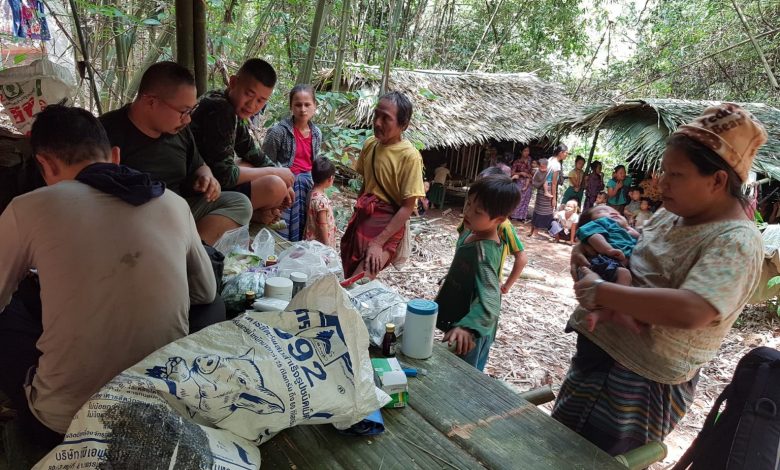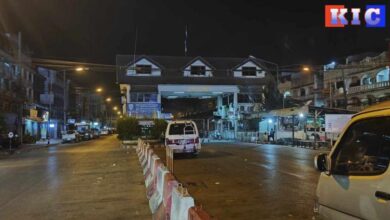Despite Airstrikes, Burma Army Attacks, Malaria, Low Supplies – Karen Villagers and Community Groups Work Together For Survival
Thousands of villagers in northern Karen State have been forced from their homes by Burma military offensives.The Karen Peace Support Network (KPSN) documented from the 12th of March to the 2nd of April a total of 27 airstrikes and 47 bombs were dropped on Karen villages, as well as 575 mortar strikes around the Mutraw district. Burma Army attacks killed 20 civilians and injured 40 others, displacing 70,000 people.

By Conor Phelan*
KPSN filmed footage of villages destroyed by airstrikes – schools, buildings and houses have been flattened, with many homes riddled with bullet holes, caused by Burma military helicopters.
The Burma Army released statements stating the airstrikes were a response to the Karen National Liberation Army’s (KNLA) seizure of a military outpost in the Mutraw district. According to interviews in the KPSN documentary, local villagers and leaders within the Mutraw district claim airstrikes have been a part of the Burma military’s strategy to gain control over the district.
In an interview with Karen News, Deputy Director of Human Right’s Watch’s Asia Division, Phil Robertson, said the Burma Army [Tatmadaw] have been escalating attacks against ethnic regions.
“The Tatmadaw’s attacks on ethnic communities are on the upswing. Myanmar’s military is once again responding to ethnic armed organizations by bombing and attacking civilians in their areas, and deliberately destroying villages, schools, and houses of worship.”
Mr Robertson explained the intimidation tactics of the Burmese Army, and its effects on the ethnic villagers.
“The Tatmadaw are blatantly abusing rights, and trying to intimidate the supporters of ethnic groups by subjecting them to indiscriminate violence. It’s no wonder that displacement in Karen and Karenni States has risen massively because the only thing that villagers can do to escape air attacks and Tatmadaw columns is flee into the jungle with whatever they can carry.”
KPSN reported that as many as 5,000 villagers have crossed the Salween River into Thailand, fleeing the constant threat of airstrikes, however Thai military have begun to turn back Karen refugees staying to close to outposts or Thai communities, according to reports.
Although living conditions for refugees in Thailand are harsh, the safety offered from airstrikes is enough to take the risk and cross into Thailand.
A father of two, in an interview with KPSN said, “being over the border has made us feel a lot safer, we can sleep peacefully at night.”
The wet season has caused already hazardous conditions to become worse, Mr Robertson explained to Karen News the difficulties displaced people are facing.
“Being forced to flee to the jungle during the rainy season means increased vulnerability to food insecurity, waterborne and insect carried diseases, and of course, Covid-19, as people are forced to stay in communal shelters. The way the Tatmadaw are treating the people as enemies to be targeted and eliminated shows the real inhumanity of the army and explains why the Burmese people are overwhelmingly opposed to a return to military rule.”
Saw Dee Doh, a health worker from the Karen Department of Health and Welfare, agreed the wet season has increased health risks for displaced people and said medics are having trouble coping with the number of cases.
“The big concern we have now is malaria and diarrhoea. During raining season, mosquito breeding increases, and there is a high risk for displaced communities to get infected. Travel is getting more difficult for our health workers accessing remote communities, and the same for communities travelling to seek medical treatment when sick. We need medical supplies to treat malaria as well as other prevention supplies such as mosquito nets and repellent.”
The risks for displaced villagers is high, and supplies are starting to run out. Saw Dee Doh pointed out medical workers are hearing less and less from humanitarian aid providers and more needs to be done to help the people.
“After the airstrikes stopped, we didn’t hear much from aid providers. They might think the situation got better but the villagers still need help as they are still unable to return to their villages. We want donors and other relevant agencies to continue their support, especially for critical medical supplies.”
Despite the desperate situation KPSN Coordinator Naw Wah Khu Shee said, “with support from district leaders, civil society and relief groups the Karen people are working to cope with this hardship, and survive.”
*Conor Phelan, is a Karen News intern




